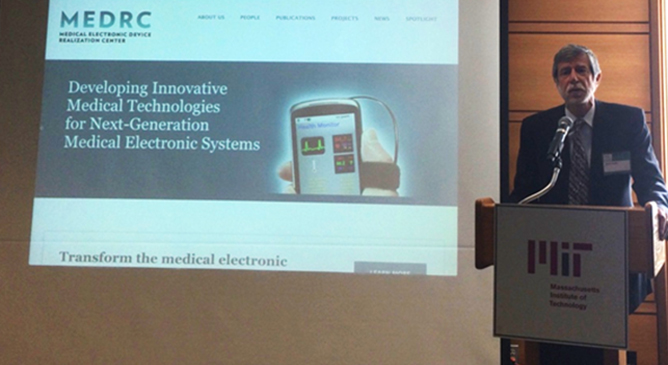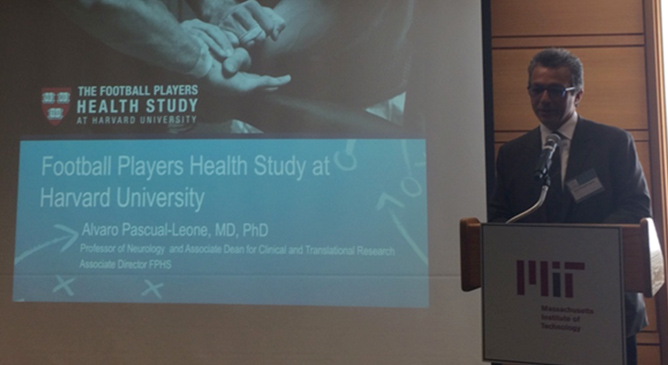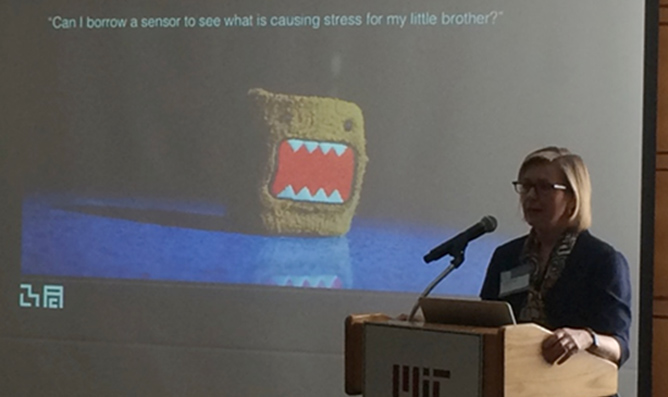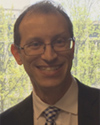Identifying Clinical Needs and Medical Solutions at the MEDRC Workshop for Medical Electronic Devices and Systems
by Bruce Hecht
There are many clinical needs with opportunities to improve outcomes and quality of care. To achieve these goals requires creative co-operation that combines the talents of medical clinicians, designers, and device engineers building systems solutions. With this purpose in mind, the MEDRC Workshop is a forum to share experiences and to expand the networks between people in diverse areas of practice.
The workshop is in its eighth year on the MIT campus in Cambridge, Massachusetts and draws on the thriving Boston & Cambridge medical, academic research, and industrial innovators as well as participants from across the USA, Canada and Europe. IEEE Life Sciences has been a sponsor of this workshop since 2014.
We invite you to participate in the 2016 MEDRC Workshop to be held 5-6 May. Keynote speakers include Jonathan Rothberg, founder of 454 Life Sciences, Ion Torrent, and 4Catalyzer who will speak on “The Development of High-Speed DNA Sequencing: Jurassic Park, Watson, Neanderthal, Moore and You”; and Brian Otis, CTO of Verily, showcasing the glucose-sensing contact lens launched by Google[X]: “The Smart Contact Lens: IC Design and Beyond.” Join us this spring on the MIT Campus at the hub of Life Sciences in Cambridge. Registration for the workshop can be accessed online as well as the agenda here.
The 2015 Workshop had many highlights including an examination of the intersection of sports and medicine; neurological needs for neuromuscular, epilepsy, and remote monitoring; a focused session on cardiology in home and clinical settings; and a systems approach to reducing readmissions through persuasive behavioural technologies.
Professor Charles Sodini, MIT, Cambridge, MA, Symposium General Chair and director of MIT’s MEDRC and EECS Department Chair Anantha Chandrakasan gave opening remarks at the 2015 Workshop. IEEE Boston Section’s Bruce Hecht then introduced the IEEE Solid-State Circuits Society Boston Chapter, the IEEE Consumer Electronics Society with Nahum Gershon of MITRE, and the IEEE Life Sciences Technical Community.

MEDRC Director Professor Charles Sodini of MIT gives the opening welcome
The Day 1 keynote talk was presented by Dr. Alvaro Pascual-Leone, Beth Israel Deaconess Medical Center and Harvard Medical School, on the recent findings of a long-term study of the “Football Players Health Study” and the effects of sports & health as a longitudinal investigation.

Dr. Alvaro Pascual-Leone of BIDMC presents the Keynote Talk
The first day proceeded with a clinically focused session on Neurology, featuring Dr. Seward Rutkove, of Beth Israel Deaconess Medical Center, Dr. Joseph Madsen and Dr. John Kheir of BCH; and a focus on Neonatal measurement with Professor David Borton of Brown University on “Rewiring the Nervous System, Without Wires,” followed by Professor William Freeman of MIT on “Video Magnification” as a technique to measure subtle motion of infants.
The afternoon attention turned to cardiology and opened with David Albert demonstrating the AliveCor ECG solution for Personal Cardiac Rhythm Monitoring; Eric Isselbacher of MGH on the Future of Home Care Monitoring; and Collin Stultz of MIT on assessing risk. Tom O’Dwyer of Analog Devices presented the “State-of-the-Art and Trends Home Health Monitoring.”
Following the panel, a lightning round of 90-second talks introduced the posters from students, post-doctoral researchers, and industry participants. Poster presenters and viewers were invited to a reception while discussing their research and the day’s talks.
Day 2 of the workshop featured the second keynote session, with Dr. Nicholas Schiff of Weil/Cornell Medical Center on “Recruiting Cognitive Reserve in the Severely Injured Brain with Central Brain Deep Brain Stimulation”, MIT Professor Rosalind Picard on “Surprise Findings From a Wearable Autonomic and Activity Sensor”; and MIT Professor Dina Katabi on “Remote Monitoring of Breathing and Heart Rate without Body Contact.”

MIT Professor Rosalind Picard illustrates devices to help patients with epilepsy
Preventing readmission was the last session and gathered three perspectives on this important issue. Dr. Jacob Joseph, of the Boston VA presented “Heart Failure Readmissions – Is There a ‘Cure’?”; Dr. Jessica McCannon of MGH spoke on “Chronic Obstructive Pulmonary Disease (COPD) and Readmission Reduction: Pipe Dreams and Smoke Screens.”; and Dr. Caroline Samara Fox, of NHLBI & BWH presented “Diabetes: a Modern Day Disease Seeks a Modern Day Solution”.
Many thanks to the Technical Program Committee, and the support of MIT and the MEDRC, the Solid-State Circuits Society and its support of the IEEE Boston Section’s SSCS Chapter, the IEEE Consumer Electronics Society, and the IEEE Life Sciences Technical Community, as well as to the speakers and the poster session presenters, and to all of our participants. We look forward to see you all and invite you to attend this year’s workshop!
Contributor

Bruce Hecht: From an early interest as an electrical and computer hobbyist in Montreal, Quebec, Canada, Bruce discovered the joy of engineering design and received the M.A.Sc. and B.A.Sc. degrees in Electrical Engineering with an Option in Mathematics from the University of Waterloo. He joined Analog Devices in 1994, where he is currently based with Global Operations & Technology in Wilmington, MA, USA. His interests are in the design and realization of all kinds of electronic systems for medical, automotive, industrial, consumer, and communications. He holds 5 US Patents and is a Six Sigma Black Belt. His current area of focus is on Engineering Systems Design through the MIT Advanced Study Program and Systems Design and Management (SDM).






